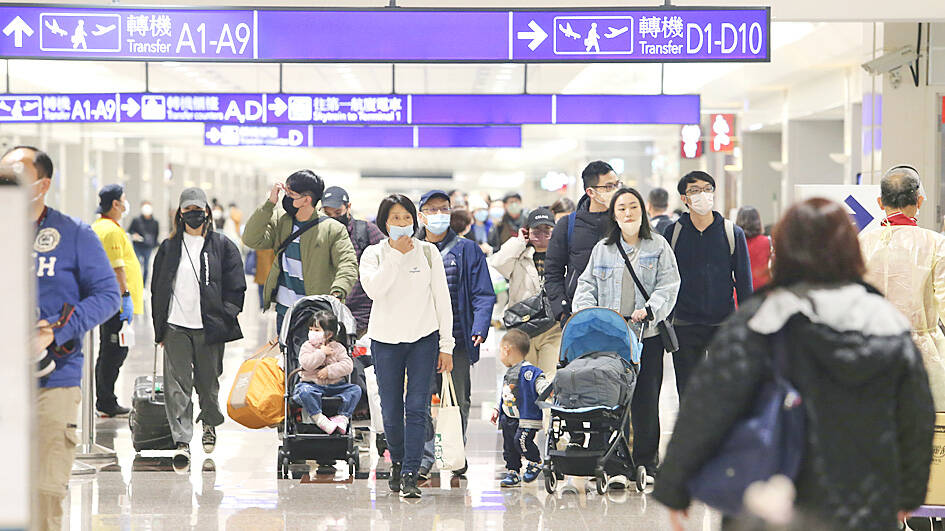The Executive Yuan yesterday approved a Tourism Bureau proposal to allocate NT$5.3 billion (US$174.31 million) from last year’s surplus tax revenue to attract international tourists in the next three years.
The bureau has funding to distribute the money — NT$5,000 each — to 500,000 international visitors, bureau Director-General Chang Shi-chung (張錫聰) told a news conference at the Ministry of Transportation and Communications in Taipei.
“The money will be given out through multiple tourism promotion events this year, rather than giving it all out at once,” Chang said. “As such, not all international tourists would receive it.“

Photo courtesy of Taiwan Taoyuan International Airport
“International tourists who are given NT$5,000 will not receive it until they arrive,” he said. “It will be stored in an electronic ticketing card, which can be used to pay for food, accommodation and other travel expenses during their time here.”
The bureau would also offer incentives for domestic and overseas travel agencies to bring international tourists to Taiwan, Chang said.
A tour group from overseas would receive a subsidy of NT$10,000 if it has eight to 14 members and NT$20,000 if it has more members, he said, adding that there was enough money for 90,000 groups.
To address staffing shortages in the hotel industry, the government would help pay the salaries of new hotel employees, he said.
“Hoteliers will receive a bonus of NT$5,000 per month for each new staff member they hire,” Chang said. “It will help raise the monthly salary of entry-level hotel employees in Taipei, Taoyuan, Hsinchu, Keelung and New Taipei City to NT$33,000 or more.”
“Hotel employees in other administrative regions would see their monthly salaries rise to or above NT$31,000,” he added.
The bonus could continue for up to one year, he said, adding that employers must not lower the salaries once the funding ends.
The bureau is planning to focus on attracting tourists from Japan, South Korea, Europe, North America and target countries of the New Southbound Policy, Chang said.
The 18 countries defined in the policy are: Australia, Bangladesh, Bhutan, Brunei, Cambodia, India, Indonesia, Laos, Malaysia, Myanmar, Nepal, New Zealand, Pakistan, the Philippines, Singapore, Sri Lanka, Thailand and Vietnam.
The goal is to attract 6 million international tourists this year, Chang said.
High-Quality of Travel Association chairman Ringo Lee (李奇嶽) said that the government should ensure that more sectors can benefit from the cash distribution to international tourists.
“The government should strive to have more international tourists visit central, southern and eastern Taiwan, not just the north,” Lee said.
While it is important to offer incentives for overseas travel agencies to organize tour groups to Taiwan, the government should also encourage them to stay in hotels and hire tour buses run by Taiwanese operators, he said.
“The number of Taiwanese traveling overseas has far exceeded the number of inbound tourists,” Lee said.
“Compared with nearby countries, we are relatively late in reopening the borders for international tourists and have fewer means to conduct international tourism marketing,” he added.
The government should also restart all cross-strait flight routes, which would boost inbound and outbound tours, he said.

An essay competition jointly organized by a local writing society and a publisher affiliated with the Chinese Communist Party (CCP) might have contravened the Act Governing Relations Between the People of the Taiwan Area and the Mainland Area (臺灣地區與大陸地區人民關係條例), the Mainland Affairs Council (MAC) said on Thursday. “In this case, the partner organization is clearly an agency under the CCP’s Fujian Provincial Committee,” MAC Deputy Minister and spokesperson Liang Wen-chieh (梁文傑) said at a news briefing in Taipei. “It also involves bringing Taiwanese students to China with all-expenses-paid arrangements to attend award ceremonies and camps,” Liang said. Those two “characteristics” are typically sufficient

A magnitude 5.9 earthquake that struck about 33km off the coast of Hualien City was the "main shock" in a series of quakes in the area, with aftershocks expected over the next three days, the Central Weather Administration (CWA) said yesterday. Prior to the magnitude 5.9 quake shaking most of Taiwan at 6:53pm yesterday, six other earthquakes stronger than a magnitude of 4, starting with a magnitude 5.5 quake at 6:09pm, occurred in the area. CWA Seismological Center Director Wu Chien-fu (吳健富) confirmed that the quakes were all part of the same series and that the magnitude 5.5 temblor was

The brilliant blue waters, thick foliage and bucolic atmosphere on this seemingly idyllic archipelago deep in the Pacific Ocean belie the key role it now plays in a titanic geopolitical struggle. Palau is again on the front line as China, and the US and its allies prepare their forces in an intensifying contest for control over the Asia-Pacific region. The democratic nation of just 17,000 people hosts US-controlled airstrips and soon-to-be-completed radar installations that the US military describes as “critical” to monitoring vast swathes of water and airspace. It is also a key piece of the second island chain, a string of

The Central Weather Administration has issued a heat alert for southeastern Taiwan, warning of temperatures as high as 36°C today, while alerting some coastal areas of strong winds later in the day. Kaohsiung’s Neimen District (內門) and Pingtung County’s Neipu Township (內埔) are under an orange heat alert, which warns of temperatures as high as 36°C for three consecutive days, the CWA said, citing southwest winds. The heat would also extend to Tainan’s Nansi (楠西) and Yujing (玉井) districts, as well as Pingtung’s Gaoshu (高樹), Yanpu (鹽埔) and Majia (瑪家) townships, it said, forecasting highs of up to 36°C in those areas